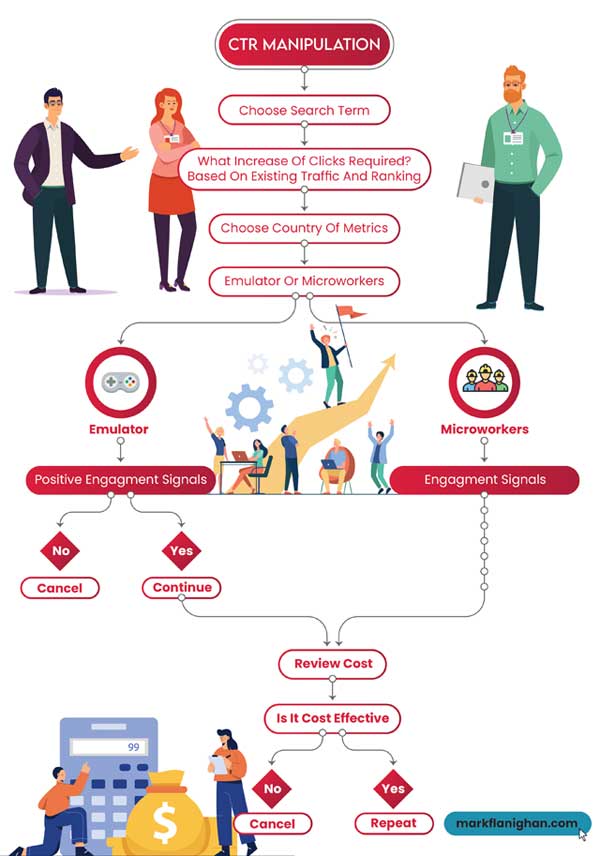Discovering the Partnership Between CTR Control Providers and Customer Actions
In the realm of digital advertising and marketing, the influence of click-through price (CTR) control solutions on user actions stays a complex and intriguing subject. As online systems increasingly count on CTR metrics to determine the success of content, items, and services, recognizing exactly how these controlled rates effect customer interaction and decision-making processes is vital. The interaction between CTR adjustment and customer habits increases questions regarding authenticity, reliability, and the honest ramifications of such practices. By studying the intricate relationship between CTR manipulation solutions and individual actions, fascinating insights arise that might reshape our understanding of digital advertising strategies and their effects on consumers.
Influence of CTR Control on Habits
Analyzing the impact of Click-Through Price (CTR) manipulation on user habits exposes vital insights into the characteristics of online interaction. CTR adjustment entails synthetically inflating the variety of clicks on a specific link or promotion to deceive individuals and online search engine. This method can cause a distorted perception of a webpage's appeal or relevance, eventually affecting customer habits.

In addition, CTR manipulation can alter the data utilized by algorithms to individualize user experiences. This can lead to customers being served material that does not straighten with their preferences or rate of interests, inevitably leading to a decline in user fulfillment and involvement. Understanding the influence of CTR adjustment on user habits is crucial for keeping openness and trust in on the internet communications.
Individual Interaction With Controlled CTR
Individual engagement with adjusted CTR information usually results in skewed understandings of on-line web content appeal and significance. When customers connect with content based upon synthetically inflated Click-Through Fees (CTR), they may think that particular details, items, or solutions are a lot more prominent or reliable than they actually are. This can cause users making choices based on deceptive data, leading to potentially negative results.
Involvement metrics like likes, shares, remarks, and time spent on a page are often affected by CTR adjustment. Individuals may be more likely to engage with web content that shows up to have greater interaction rates, even more bolstering the cycle of manipulated assumptions. As an outcome, material creators and marketers may prioritize generating material that produces high CTR instead than focusing on producing truly important and relevant product.

Psychological Impacts of CTR Manipulation

Furthermore, the mental effects of CTR control can also manifest in transformed decision-making processes. Users might be a lot more inclined to click web content entirely based on its regarded popularity, instead of its real value or significance to their demands. This behavioral change can cause a superficial involvement with on the internet web content, where users may overlook top quality yet much less popular offerings in support of those with synthetically enhanced CTRs.
In significance, the mental implications of CTR manipulation highlight the importance of maintaining transparency and authenticity in on-line interactions to cultivate real user interaction and trust.
Honest Considerations in CTR Manipulation
CTR manipulation elevates problems concerning tricking individuals, distorting information analytics, and endangering the integrity of online material. By artificially pumping up CTR, users may be deceived into clicking on links or ads they would certainly not have actually chosen otherwise, leading to a disingenuous online experience.
Another honest facet to contemplate is the justness of adjusting CTR to gain an unreasonable advantage over competitors. Taking part in such practices not only violates concepts of fair game however additionally weakens the depend on that individuals place in on the internet platforms. It is necessary for services and digital marketers to maintain moral criteria in their methods to make sure transparency, reputation, and lasting sustainability in the on-line atmosphere.
Implications for Digital Advertising And Marketing
With the boosting dependence on digital platforms for advertising and marketing purposes, the technique of controling click-through rates (CTR) poses substantial implications for the efficiency and honesty of electronic advertising techniques. CTR adjustment can result in manipulated information analytics, misdirecting marketing experts right into thinking that their projects are executing better than they in fact are. This can cause misallocation of sources, with companies purchasing underperforming approaches based on falsified CTRs. When users realize that CTRs have been adjusted, it can wear down trust in the brand name, leading to long-term unfavorable consequences for customer loyalty and brand reputation.
Additionally, making use of CTR control services can develop an unfair affordable landscape, where companies that participate in such methods obtain a man-made benefit you could try these out over those that adhere to moral advertising and marketing criteria. This can suppress advancement and creative thinking in electronic advertising and marketing, as success ends up being more regarding manipulation methods than supplying genuine worth to consumers. Inevitably, the ramifications of CTR manipulation for electronic advertising and marketing prolong beyond temporary gains, affecting the general sustainability and credibility of advertising efforts in the electronic world.
Verdict
Finally, the connection in between CTR manipulation services and user behavior is complex and complex. The effect of CTR manipulation on behavior, individual interaction with adjusted CTR, mental results, ethical factors to consider, and effects for electronic advertising and marketing all play a function fit this connection. Understanding these dynamics is important source crucial for marketing experts and researchers alike in order to browse the honest effects and make best use of the effectiveness of their digital advertising and marketing techniques.